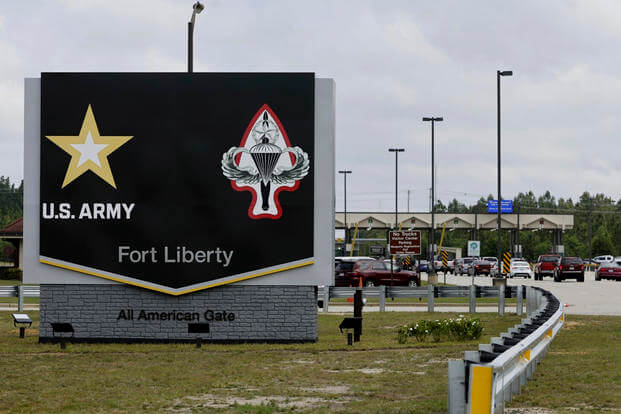The opinions expressed in this op-ed are those of the author and do not necessarily reflect the views of Military.com. If you would like to submit your own commentary, please send your article to opinions@military.com for consideration.
The renaming of Fort Bragg, North Carolina, mandated by Congress and formalized in a ceremony in June, was an opportunity to remind not only the installation's current and future troops and families, but also the country, of the social value of our Army. In selecting the name "Liberty," the Pentagon wasted an opportunity.
The shedding of the base's Confederate namesake was appropriate and overdue and the Department of Defense should be lauded for its aggressive movement. The installation's leadership had an opportunity to name the post after a legendary figure from its grand heritage. The editorial board of the Fayetteville Observer, the daily local paper that has been covering Fort Bragg since its inception, advocated for "Fort Ridgway."
Gen. Matthew Ridgway's role in the desegregation of United Nations forces fighting in Korea, a move that was remarkably unpopular with soldiers and generals across the Army, remains an underexamined moment in American history. It was a bold move that had momentous ramifications for society at large for decades to come. The process shamed the Army into belatedly and begrudgingly acting on President Harry Truman's military desegregation order of 1948. The ceremonial process of renaming one of the nation's most celebrated bases could have brought Ridgway's courageous decision into current discussion, even if just for a brief moment.
Or choosing to go with "Fort Porter," in honor of Capt. James Porter, the original commander of the all-black 555th Parachute Infantry Battalion, could have brought national attention to the inspiring story of "the Triple Nickles." The paratroopers of the Triple Nickles performed so admirably in their wartime mission during World War II that they were integrated into all-white units on Fort Bragg one year prior to Truman's desegregation order.
By contrast, "Liberty" offers no such reflection. It is a banal bromide that can mean virtually anything to anyone. It's lazy. It's safe. It treats our most fabled institution as a mere commodity. It's the equivalent of naming the installation Fort Blue or Fort 1234567. The new name was immediately and intensely unpopular with veterans and currently serving soldiers. To avoid offending anyone, the leadership disappointed everyone.
Naming streets, schools and military bases after historic figures is an endeavor soaked in risk: No figure in American history can be classified as purely "good." Not MLK, JFK, Lincoln, Washington. Not Eisenhower, Grant, Pershing.
No, we are inward-seeking, complicated creatures; legacies are messy, particularly when past actions are weighed against present social mores. With enough publicly available information, all heroic figures come under criticism. This is true of Ridgway. It's also the reason we should honor the humanity, the moments of golden triumph and examples of compassion that men and women like him gave us.
"Liberty" is a lifeless, bloodless platitude -- any installation in America could fit the sobriquet. The Home of the Airborne and Special Operations, the installation established to form an American artillery force for our first global war and then restructured in the Cold War by Lt. Gen. Ridgely Gaither as an experimentation center for a rapid-deployment force, deserves better. It deserves a name commensurate with its history, lineage and legacy, a name befitting the soldiers who've served there for decades and will serve there for decades to come.
-- Joe Buccino is a retired U.S. Army colonel, writer and the director of Grave of Bulkington Media. He resides in Washington, D.C.













